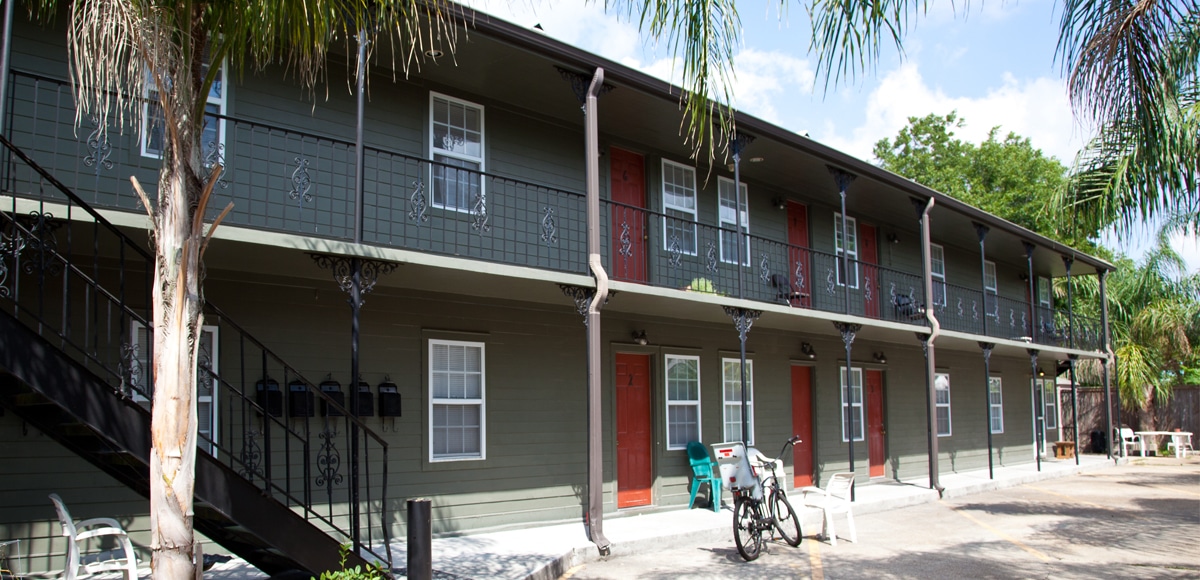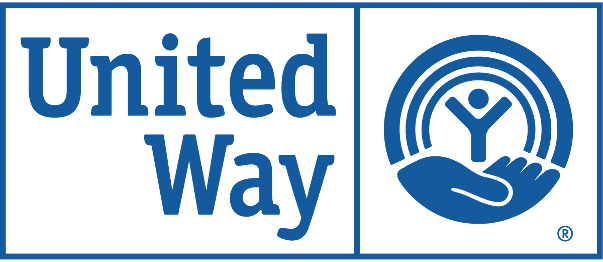Published on May 16, 2016
Catholic Charities’ Ciara House program took in its first clients, homeless individuals with a form of mental illness, in April of 1983. During this time, New Orleans was housing most of its citizens with mental illnesses in state mental health hospitals and was in great need of a housing program. The original group of Ciara House clients had been living in a mental health hospital for more than 20 years. Over time, Ciara House also began to serve individuals who had not been hospitalized for an extended period of time and saw great success transitioning these clients to live a more independent life.
A New Model for Mental Illness
Under the leadership of Sister Anthony Barczykowski and Monetta Clark, the Ciara House program expanded. Sister Anthony, the executive director of Catholic Charities at the time, began to move clients capable of independent living from Ciara House into empty Archdiocesan-owned buildings to create a safe housing community for the mentally ill. A new model for housing the mentally ill was born.
The state of Louisiana referred individuals to Ciara House, where staff worked with clients to educate them about mental illness, the need to effectively take their medication, and how to avoid hospitalizations. After a year or two, many clients “graduated” from Ciara House and moved into the independent apartments. These apartments were funded solely by Catholic Charities and the residents who paid a modest rent to cover building costs. Residents were able to utilize the support services of Ciara House and thrive in a community of individuals with similar shared experiences.
During this time, Ciara House had staff on call 24 hours a day, in order to be a resource for both the in-house clients as well as those in the independent living apartments. Monetta Clark, a founding member of the program, recalls receiving a phone call from an apartment resident one morning who said that she had been struggling with depression and was not sure that she could make it to work. Clark convinced the woman to attempt to go to work and spoke to the woman throughout the day to make sure she had the support that she needed.
The caring staff and tightly knit community was truly life changing for a group of people often seen as outcasts. By 2004, the program had 12-15 clients in its group home and over 50 people in independent apartments.
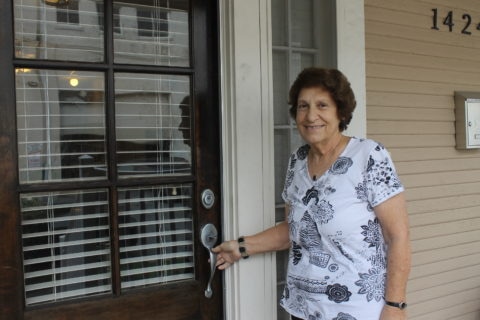
Monetta Clark
Hurricane Katrina
When Hurricane Katrina hit in 2005, the group home clients and three staff members evacuated to Brandon, Mississippi. Due to a lack of time and resources, the apartment residents were forced to make evacuation plans on their own. When it was apparent the destruction of the Hurricane would make it impossible to immediately return to the city, the residents moved into an empty house owned by a parish church in Brandon.
“The parish was so wonderful,” said Monetta Clark, who had travelled with the clients to Brandon. “They really took care of these people. The state of Mississippi provided all of the necessary medical treatment and the parish provided meals and stability in an uncertain time.”
When the group returned to New Orleans nine weeks after the storm, they found the damage to both the group home and the apartment buildings was manageable. The program was the only state-funded mental health group home that survived Katrina.
With a grant from the Red Cross after Katrina, Ciara House was able to buy an apartment complex on Dante Street where the program is currently located. The house next door was owned by a local bank who generously donated it to the program for an office location.
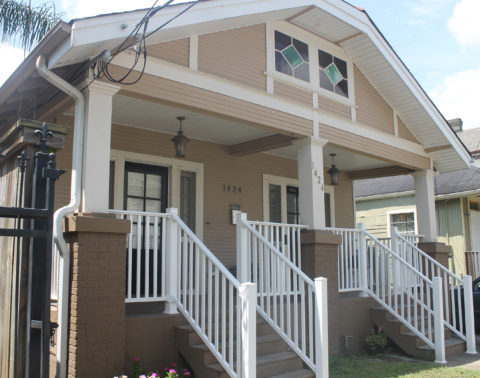
New Dante Street location
Ciara Independent Living
Due to state budget cuts in 2010, the Dante Street location transitioned into an independent living apartment complex for single adults with mental illness. Using their federal disability income, residents pay rent, provide their own meals, and are able to live a relatively independent life at essentially no extra cost to local tax payers. Program Coordinator Bob Wardlaw, who has been with the program since 2007, has been running the Dante Street apartments since 2015. Now called Ciara Independent Living, the program has expanded to include a location in Metairie and serves 34 residents. Residents are referred to the apartments by a multitude of sources including case managers, hospitals, and the National Association for Mental Illness (NAMI).
The residents of Ciara Independent Living are already working with case managers when they enter the apartments to ensure they are stable and getting the treatment that they need. The average resident is middle-aged and usually suffers from a disorder like schizophrenia. Wardlaw, along with a former resident who now provides maintenance services, serve as both property managers and problem solvers for the residents.
“It really helps the residents just to know that I am there and I care about their situation,” says Wardlaw. “Ninety percent of my job is listening to people.” The residents also look out for each other, helping one another with food when funds run short, and providing a stigma-free safe community.
The ultimate goal for the Ciara Independent Living residents is to reach the highest level of independence, which starts with the way other people interact with them. When Wardlaw started working with Ciara House, he had no experience with mental illness.
“My idea of mental illness when I came to work on my first day and now are worlds apart,” he says. He quickly learned that the most effective way to reach his residents was to treat them like normal adults. “It’s really rare for them to have those types of interactions, and they really respond to it,” he adds.
Ciara Permanent Housing
At the same time the state budget cuts transitioned Ciara Independent Living into a housing-only program, Catholic Charities sought other sources of funding to continue to provide case management to people with mental illness in New Orleans. Alongside Ciara Independent Living, they formed Ciara Permanent Housing using funding from the United States Department of Housing and Urban Development (HUD). Ciara Permanent Housing provides both housing and intensive case management to people with mental disorders around New Orleans using HUD funding. It differs from Ciara Independent Living because the Ciara Permanent Housing residents not only receive case management, but they are also spread throughout individual apartments around the city and not in a shared community building.
Mike Lomax, Ciara Permanent Housing Program Director, serves as the case manager for all 15 clients the program serves. He helps them with home management, budgeting, doctor visits, medication checks, and makes weekly home visits. Lomax says it was difficult for him to build trust with his clients at first, because they are all accustomed to stigmatization and isolation. Because these clients are spread out in apartments around the city, they do not have the same community resources as the residents of Ciara Independent Living. Lomax makes himself available to his clients 24 hours a day to ensure they always have a person willing to listen and help.
Lomax and Ciara Permanent Housing have been wildly successful with treating their clients. In its five years under the direction of Lomax, only one person has left the program. Lomax says he has almost no crisis calls to the emergency room or psychiatric wards, which were regular occurrences for many of the clients before they joined the program.
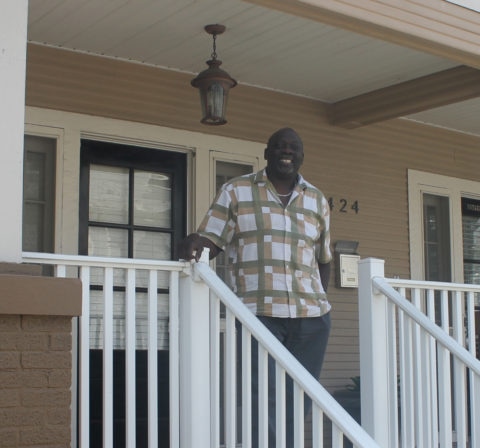
Mike Lomax
Mental Health Today
Both Ciara Independent Living and Ciara Permanent Housing have proven amazingly successful resources for the mentally ill around the city, but these programs combined only serve 50 individuals due to housing space limitations and requirements to receive federal funding.
Dr. Elmore Rigamer, the Medical Director for Catholic Charities, explains the problem with effectively serving the mentally ill begins with lack of medical institutions and funding for treatment. Many primary care physicians are uncomfortable with seeing the mentally ill, he says, and most mentally ill people cannot afford primary care in the first place. Furthermore, the mentally ill who go untreated wind up on the street. He estimates that up to one half of the homeless population in New Orleans suffers from some form of mental illness.
With no state funding available, Catholic Charities is doing everything it can to help this vulnerable population through private and foundation donations. “Catholic Charities and Ciara House have been really heroic in dealing with the mentally ill and homeless,” Dr. Rigamer proudly says. “We have never been out of the business of taking care of the homeless.”

